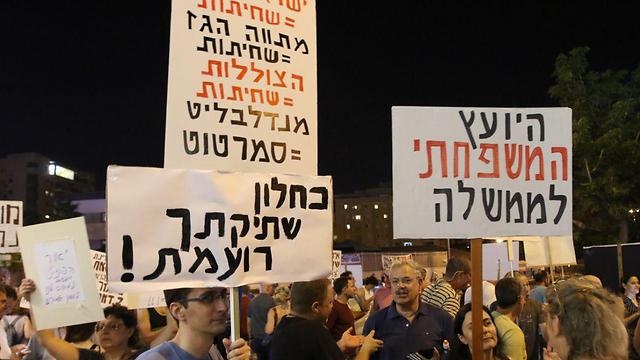Incoming Supreme Court Chief Justice Esther Hayut rejects petition to limit number of protesters outside Mandelblit’s home to only 500; ‘No democratic authority or public servant is immune to criticism,’ says Hayut.
The High Court of Justice (HCJ) on Sunday authorized demonstrations to take place outside the home of the Attorney General’s home in Petah Tikva without the need for a permit from the police and without any limits to the number of participants.
“Criticism of state authorities and of public officials is the bedrock of democracy, and there is no democratic authority or public servant that is immune to criticism,” said Judge Esther Hayut, who was recently appointed to become the next chief justice of the Supreme Court.
“This applies both to judges and to the attorney general,” added Hayut, who is set to replace Miriam Naor.

“For these reasons, it must be determined that the demonstrations on Saturday night at Goren Square are not an ‘inferior’ expression worthy of limited protection, but rather they are the implementation of the freedom of expression, which is at the heart of the fundamental freedoms that make up a deomcratic society,” Hayut continued.
Attorney General Avichai Mandelblit, she said, “is one of the central and most important pillars on whom the law enforcement system rests. Preserving his independence and the impartiality of (the Attorney General’s Office) is therefore one of the clearest guarantees of the preservation of democracy in Israel. Therefore, the attorney general, just like every other public servant, is also not immune from public censure.”
In light of her conclusions, Hayut insisted that the protests—which have been taking place every Saturday night over what demonstrators claim is the attorney general’s hesitant and lackadaisical conduct on the investigations against Prime Minister Benjamin Netanyahu—do not require a police permit, but merely an advance warning in accordance with security procedures in public places.

“To remove any doubt, I would also propose to determine that the police are allowed to set conditions to the protests at Goren Square for the sake of public order in the area and in order to prevent harm to the religious sensitivities of the neighborhood,” she continued.
“Police may also examine in the future the length of the protest at Goren Square insofar as there is a change in circumstances that would justify it.”
Hayut explained that if the HJC accepted a petition urging it to restrict the number of participants to 500, it would be an encroachment on the rights of a significant portion of the public—around 2,000 people.
However, imposing limits in the future under certain circumstances was not ruled out.

“There may be cases justifying a reduction and limits on the number of protesters, but this is not one of them. No evidence has been presented before us showing that the square cannot accommodate 2,500 demonstrators or that allowing this number of protesters to come and demonstrate at the site will likely lead to serious disruptions to public order or undermine public security,” Hayut read.
“Moreover, we are not convinced the police lack the means to impose order on a protest of this sort, which is moderate when compared to other protests we have experienced.”
In August the HCJ issued a temporary injunction allowing weekly demonstrations to continue outside Mandelblit’s home.
The court order allowed up to 500 protesters to continue demonstrating at Goren Square in Petah Tikva without needing special police authorization until a decision was made on a petition by the Movement for Quality Government in Israel, which appealed police decision to bar them from the square.
As reported by Ynetnews
